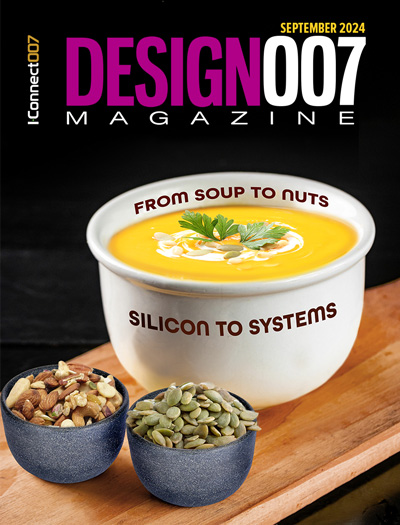-

- News
- Books
Featured Books
- design007 Magazine
Latest Issues
Current Issue
Rules of Thumb
This month, we delve into rules of thumb—which ones work, which ones should be avoided. Rules of thumb are everywhere, but there may be hundreds of rules of thumb for PCB design. How do we separate the wheat from the chaff, so to speak?

Partial HDI
Our expert contributors provide a complete, detailed view of partial HDI this month. Most experienced PCB designers can start using this approach right away, but you need to know these tips, tricks and techniques first.

Silicon to Systems: From Soup to Nuts
This month, we asked our expert contributors to weigh in on silicon to systems—what it means to PCB designers and design engineers, EDA companies, and the rest of the PCB supply chain... from soup to nuts.
- Articles
- Columns
Search Console
- Links
- Media kit
||| MENU - design007 Magazine
Estimated reading time: 7 minutes
The Government Circuit: News on Defense Electronics, Europe, and Sustainability
September in the United States is the season for back-to-school and football. In the arena of government policy advocacy, it’s the season for election campaigning and wrapping up the work of the current session of Congress.
This month, there will be a flurry of efforts in Congress by legislators to complete action on “must-do” legislation, especially spending plans for FY25, which begins Oct. 1. In October, there will be a recess for the home stretch of the campaign; in November and December, there will be one more round of policy action by the “lame duck” office holders before the new U.S. government takes office in January. Now is the time for us to try and get those ducks in a row.
We’re also continuing to advocate for our industry in Europe, and we’re watching several ongoing policy concerns related to environmental regulation and sustainability policy.
Action on Defense Electronics
One of our top priorities this month is rallying support for U.S. investments in trusted PCBs for defense applications. The U.S. Senate version of the FY25 defense appropriations bill includes $45 million for investment in advanced PCB manufacturing under the Defense Production Act, but the House version includes no such funding. Barring an unexpected bipartisan agreement, a “continuing resolution” is likely to be enacted to fund the government for the first few months of the new fiscal year. But for the final, full-year package, IPC is advocating for the Senate number, which would be one of the biggest wins for the electronics industry in decades.
Earlier this year, IPC and the PCBAA submitted a letter signed by 49 industry executives urging increases in DPA funding to support the U.S. PCB industry. IPC also convened an “IMPACT Day” in Washington in May, during which IPC members visited more than 14 congressional offices to press for this funding. IPC endorsed a defense investment plan offered by Sen. Roger Wicker (R-MS), which called for an additional $300 million in FY25 investments in defense technologies including microelectronics, with additional funding in future years.
If your company operates or has key customers in California or Connecticut, we could use your help in contacting key members of the House Appropriations Committee from those states. If you’re willing to help, please contact Rich Cappetto, richardcappetto@ipc.org.
In other defense-related news, the U.S. Office of Strategic Capital (OSC) is seeking input from companies, industry associations, lenders, and financial institutions regarding their capital needs. The OSC, which was created within the Department of Defense in December 2022 and codified by the FY2024 National Defense Authorization Act, aims to attract private capital to bolster critical technologies in the defense supply chain. Under its current investment strategy, OSC is developing a program of loans and loan guarantees for key enabling technologies at the component level across 31 critical technology areas. Comments are due to OSC by Oct. 22, 2024. To help support its members, IPC will present a briefing on OSC's initiatives; watch your favorite IPC information channels for more details.
On another front, the U.S. Department of Commerce’s Bureau of Industry and Security (BIS) has released new guidance designed to help industry and academia prevent export diversions to countries or entities of concern. The guidance informs stakeholders about potential risks beyond those on public screening lists, such as the Entity List. It also introduces a recommended best practice for screening transaction parties using the online resources of the Trade Integrity Project, which identifies third-country suppliers who export Common High Priority List items to Russia. For electronics manufacturing companies, this may mean:
- An urgent need to enhance screening processes
- Adopt additional due diligence measures
- Strengthen training and compliance programs
- Seek closer collaboration with BIS and other industry stakeholders
By implementing these practices, members can better protect their operations, maintain regulatory compliance, and contribute to national security.
In Europe, an IPC Call to Action
In Brussels and other capitals across Europe, IPC and the electronics manufacturing industry continue to make the case for a “silicon to systems” industrial strategy.
In June, IPC published a report in partnership with DECISION and IN4MA, “Securing the European Union’s Electronics Ecosystem,” which predicts a further drop in Europe’s global market share and growing risks to an array of critical sectors including aerospace and defense. IPC also issued a “call-to-action,” which now has support from 45 companies, 17 trade associations, and the European Space Agency, jointly urging the adoption of an Electronics Manufacturing Strategy under the European Commission’s next five-year mandate. Such a strategy should include investments and policies to reduce EU electronics dependencies in areas such as semiconductors, health, and digital technologies. In July, IPC has participated in high-level meetings with European Commission Cabinets to discuss these issues.
IPC has long made the case that electronics manufacturing lies at the heart of Europe’s future, and a holistic approach is needed to reinforce the industry’s resilience. As is the case in the United States, the European Chips Act was an important first step, but many vulnerabilities remain. As part of a stakeholder dialogue last year with the European Commission, an IPC-curated report highlighted the key capacity and capability gaps in Europe’s printed circuit board (PCB) and electronics assembly sectors, and called for new measures to support their competitiveness, resiliency, and growth.
I invite everyone with an interest in EU electronics manufacturing to read IPC’s latest report and support the industry Call-to-Action. For more information, contact Alison James, IPC senior director for European government relations.
Sustainability News from the U.S. and Europe
In the realm of sustainability and environmental policy, we are watching several key issues, and we’re pleased to welcome a new expert to our team.
In July, IPC joined in a letter that stated the upcoming White House Sustainable Chemistry Strategy should address the critical “pain points” that the electronics industry faces in transitioning to safer, more sustainable products. The letter was sent by Change Chemistry, a coalition of over 100 members, to the White House Office of Science and Technology Policy (OSTP). Change Chemistry also organized two recent policy events anticipating the OSTP report: a Congressional briefing on July 31, and a roundtable co-hosted with the Department of Energy on August 1. Follow Change Chemistry on LinkedIn or contact IPC’s Kelly Scanlon if you have any questions.
Also in July, IPC and iNEMI hosted an in-depth webinar recapping their workshop at the Electronics Goes Green conference in Berlin, focusing on the pressing circularity challenges in electronics manufacturing. The webinar covered industry-driven solutions such as new standards, better data, and educational resources to promote the adoption of circularity. Based on feedback received during the webinar, several working groups focused on priority problem areas are convening this fall with the goal of proposing actionable solutions by the end of 2024. Read more details on the IPC Blog, and access the webinar recording, slide deck, and poll results for more details.
Across the pond, the Council of the European Union adopted the Corporate Sustainability Due Diligence Directive (CSDDD), completing its course through the policy process. The CSDDD requires large companies to report on the impacts of their activities on human health and the environment, covering their operations, subsidiaries, and supply chain members. Following its publication in the Official Journal of the European Union, Member States will have two years to implement the directive at the national level. Then the directive will be phased in over five years. IPC will continue to monitor this new regulation and keep you informed of how it may affect your company.
Last but not least, we were pleased to welcome the addition of Diana Radovan, Ph.D., to our team as IPC’s new sustainability policy director, who is based in IPC’s Munich, Germany office. With years of significant, multi-sector experience in chemistry and regulatory affairs, Diana will lead our industry’s engagement with governments worldwide on matters related to sustainability. She is skilled in analyzing and distilling complex, technical matters to inform and influence policymakers. Please follow her on LinkedIn and join us in saying welcome.
As our IPC Government Relations Team continues to advocate for you in the halls of government, please reach out with any questions or feedback.
Chris Mitchell is IPC’s VP of global government affairs. Contact him at ChrisMitchell@ipc.org.
More Columns from The Government Circuit
The Government Circuit: Support for Defense Spending Takes Top PriorityThe Government Circuit: Driving Resiliency and Economic Security on Both Sides of the Atlantic
The Government Circuit: An ‘Interesting’ Year in Washington and Brussels
The Government Circuit: IPC Advancing Silicon-to-Systems With Government Leaders
The Government Circuit: PCBs, Advanced Packaging Key to CHIPS Act Success
The Government Circuit: Building Industry Resilience in 2023
The Government Circuit: Help IPC Advocate for Our Industry
The Government Circuit: U.S. Congress Gets Serious About Boosting U.S. PCB Sector


